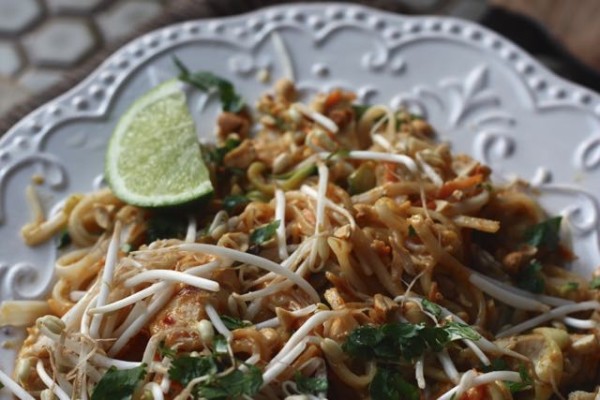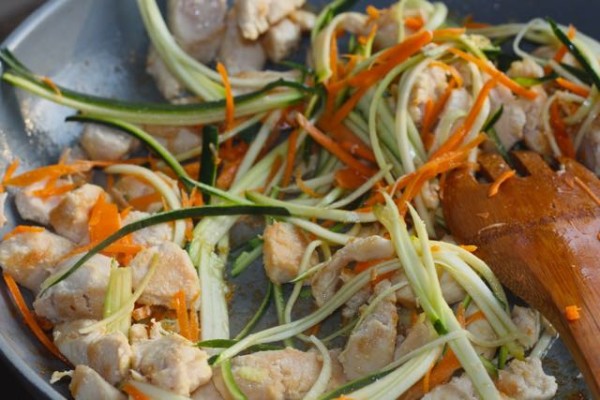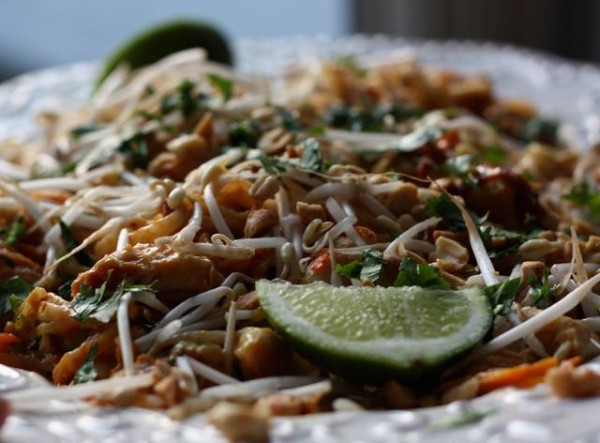Since our recent trip to Thailand, I continue to crave all the amazing dishes Russ and I indulged in on our visit. The food, seriously, was so delicious and full of fresh ingredients.
One of my favorite Thai dishes is Pad Thai. Most of my low FODMAP diet followers seem to do well when ordering Pad Thai while dining out. It is an easy dish to find at your favorite Thai restaurant. Most recipes for Pad Thai call for red curry paste. I just happened to have brought some home from our recent trip to Thailand but it is easy to find in the Asian section of the grocers. BUT: red curry paste often contains garlic and onion! I seem to tolerate the small amount found in the entire Pad Thai recipe, but if your tummy is particularly sensitive, you might try to make some homemade red curry paste to substitute in this recipe. I found an interesting Pad Thai recipe here and it included a low FODMAP version of red curry paste.
Most of my low FODMAP diet followers seem to do well when ordering Pad Thai while dining out. It is an easy dish to find at your favorite Thai restaurant. Most recipes for Pad Thai call for red curry paste. I just happened to have brought some home from our recent trip to Thailand but it is easy to find in the Asian section of the grocers. BUT: red curry paste often contains garlic and onion! I seem to tolerate the small amount found in the entire Pad Thai recipe, but if your tummy is particularly sensitive, you might try to make some homemade red curry paste to substitute in this recipe. I found an interesting Pad Thai recipe here and it included a low FODMAP version of red curry paste.
For my recipe, I julienned a zucchini and a couple carrots, ( did I mention that I love my julienne peeler?), washed about 2 cups of Mung bean sprouts and a small bunch of cilantro. I prepped the veggies earlier in the day so I would feel less rushed putting the recipe together at dinner time.
Julienned vegetables need very little time to cook (bonus)! They wilt in moments once added to my prepared chicken. While the chicken, noodles and veggies cooked, I mixed up a nice peanut pad Thai sauce…so tasty. I used my red curry paste from Thailand in my recipe, but again, if your tummy is very sensitive or you have just started the elimination phase of the low FODMAP diet, you should try to make your own red curry paste or perhaps leave it out of the recipe.
While the chicken, noodles and veggies cooked, I mixed up a nice peanut pad Thai sauce…so tasty. I used my red curry paste from Thailand in my recipe, but again, if your tummy is very sensitive or you have just started the elimination phase of the low FODMAP diet, you should try to make your own red curry paste or perhaps leave it out of the recipe.
 The dish was a big hit. Really…there was not even one noodle left on the plate!
The dish was a big hit. Really…there was not even one noodle left on the plate!
And in the spirit of Thailand, I thought I would share a couple pictures from my trip!
2 week old elephant nursing, Chiang Mai.

Ingredients
- Makes 2-3 servings
- 4 ounces of Pad Thai rice noodles
- 2 teaspoon toasted sesame oil
- 2 tablespoons all natural peanut butter
- 1 tablespoon soy sauce
- 1 tablespoon red Thai curry paste (often contains some garlic & onion-can sub in homemade find link to recipe in post)
- 1 teaspoon brown sugar
- 1 teaspoon rice wine vinegar
- 8 ounces skinless boneless chicken breast, cut in bite size pieces
- 2 tablespoons garlic infused oil
- 1 tablespoon ginger, minced
- 3 large carrots, julienned
- 1 medium zucchini, julienned
- 1 cup mung bean sprouts
- 1 lime, cut in 1/4s
- Fresh cilantro or basil, chopped (2 tablespoons or so)
- 1/4 cup salted peanuts, chopped
Instructions
- Cook noodles per package directions, rinse and drain well.
- Add 1 teaspoon toasted sesame oil and chicken to large non-stick skillet and cook over medium heat. When chicken is almost cooked through, add garlic oil, ginger, carrots and zucchini until veggies are al dente.
- While noodles and chicken are cooking, prepare sauce by combining remaining 1 teaspoon sesame oil, peanut butter, soy sauce, red curry paste, brown sugar and vinegar.
- Add cooked and drained noodles to chicken and vegetables. Turn off heat. Drizzle sauce over and gently mix. If sauce seems too thick, add some warm water to the dish.
- Transfer mixture to a platter. Garnish with bean sprouts, fresh cilantro or basil and nuts.
- Squeeze 2 of the lime quarters over dish and reserve 2 for garnish on platter.
Five winners have been selected to win the free iTunes promo code to download the Monash University app. You will receive an email today with instructions! Thanks for all the great food suggestions: Please note that some food items listed in the comment section by blog followers may or may not be suitable for the diet! Always read ingredients!



Chris
Yum…can’t wait to try it! I miss not eating Asian cuisine since I’m always concerned about garlic, shallots, and onions.
On another note, with Monash’s recent post on sourdough spelt bread, I tried Berlin Natural Bakery Sourdough Spelt bread this weekend. Got it at Whole Foods in the frozen foods section – expensive (but we’re worth it, aren’t we?!) but very tasty!
Happy spring Kate!!
Marcia
Thank you for sharing the info re: Berlin sourdough spelt. I wanted to try it but according to their website, it isn’t sold fresh anywhere in Oregon. I checked the fresh sections of local health food stores – but didn’t think to look in the frozen sections. Appreciate this info very much!
Gail
Kate, thank you for the recipe and the beautiful, sensitive photos you posted from your trip….I am headed to Myanmar this summer and hope my stomach can handle it! Peace, Joy, Hope, Health and Happiness….Namaste
Linda
This looks delicious! I will be making plans to make this for my husband and I.
Thank you so much for all of the information on FODMAPS, you have so generously provided to us.
Have a wonderful day,
Linda
margaret
Have been on low fodmap for a month now and am wondering how to introduce foods. I know that one item every 3 days is usual, but what if you show symptoms and start the next food. How do you know which or if both are bothering you. I’m not sure how to differentiate between them. Example, if you are bloated and having more gas and then you try something else how do you know if that food is not good for you too. Would really appreciate some more detail on this. Finding it kind of difficult. Thank you.
Donna
Hi Margaret,
My fodmap journey has been very convoluted and results obfuscated……so I’ve gone to a dietician for help. Her plan –
*eat strictly low fodmap until your gut is has settled, 6-8 weeks
*select one section of the fodmap empire (i.e. either fructans, GOS, lactose or polyols) and choose your fave foods in that section. (I chose GOS)
*with one only food, (for me, onion) try a v small dose (1/4 cup) with your meal.
*wait for 24 hrs and diarize any symptoms. If significant symptoms, abandon that food.
*if tolerated, try that same food at double the original dose (my case,1/2 cup)
*wait for 24 hrs and diarize any symptoms. If significant symptoms, abandon that food.
*if tolerated, try that same food at four times the original dose (my case,1 cup)
After any adverse reaction, wait until the gut settles for as long as it takes, before proceeding onto next trial.
*try another food from the same section. (garlic – 1/2 clove, 1 clove, 2 cloves)
If you follow these guidelines you will learn just which are your trigger foods and how much of them you can eat (if at all) before triggering a reaction.
The Monash University FODMAP phone app, although pricey, is a godsend in my view.
Good luck!
Adrienne Miesmer
Kate, are ramps ok? Just the leaves of course?
Gutsy Broad
Thanks for the awesome tip regarding pad Thai in restaurants. I’ve been following low fodmap diet for couple of years – get too scared to experiment with eating out. Garlic and onions are in everything! Guess it’s time to figure out what my tolerance REALLY is. Thanks for sharing!
Kate Watson
Pad thai is one of my absolute faves so can’t wait to try this! Thanks for sharing your photos too- it’s one of my dreams to get to Thailand.
katescarlata
Thailand was amazing, Kate. Worth the long flight.
Michelle
Made this tonight and LOVED it. I’m testing recipes for my grad school son – he will be home for a month and will try the low FODMAP for his IBS. I did the recipe like it’s posted but added 2 tsp crushed red peppers and 3 TBL chopped green onions (green only). I used basil instead of cilantro but I bet either is good. It was very good and we will def make it again, even off the diet!
Lisa J
Great recipe, really tasty and it will become a regular in our house. I made my own red curry paste because my husband is on the low fodmaps diet due to recently diagnosed post infection IBS and I have IBS too but can tolerate garlic. I marninated the chicken for about an hour in the red curry paste which I think added extra flavour. Try this recipe if you want a tasty Thai treat.
Margrethe
This looks delicious!
Was it difficult to follow the low FODMAP diet in Thailand?
I am headed to Thailand this summer.
Do you have any good advice for me? 🙂
katescarlata
Margrethe, I did not find modifying FODMAPs difficult in Thailand. Rice noodle dishes are everywhere. Spring rolls filled with tofu or shrimp were easy to find. I am not particularly sensitive to garlic—so that made it easier for me. I did find that fresh foods were everywhere and finding a yummy salad was easy. I always bring snacks with me when I travel. I encourage you to do the same. It was helpful to have easy to tolerate foods at my fingertips when I was at the beach or hiking around. Thailand is a magical place. I really hope to get back there again!